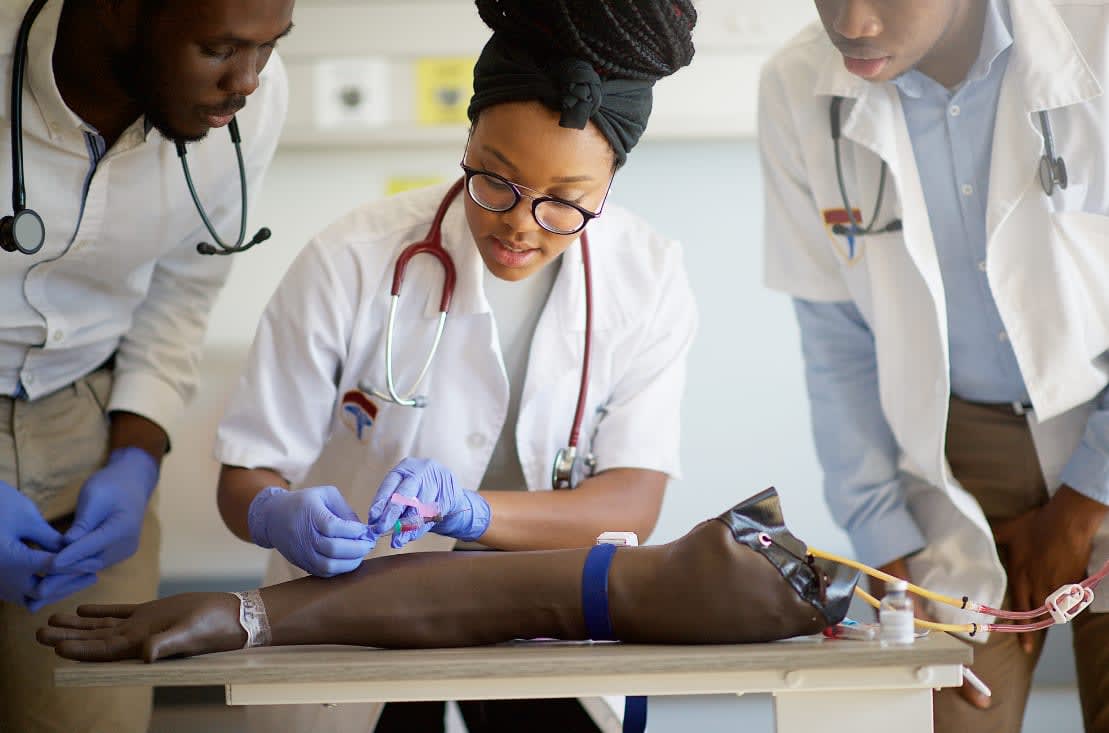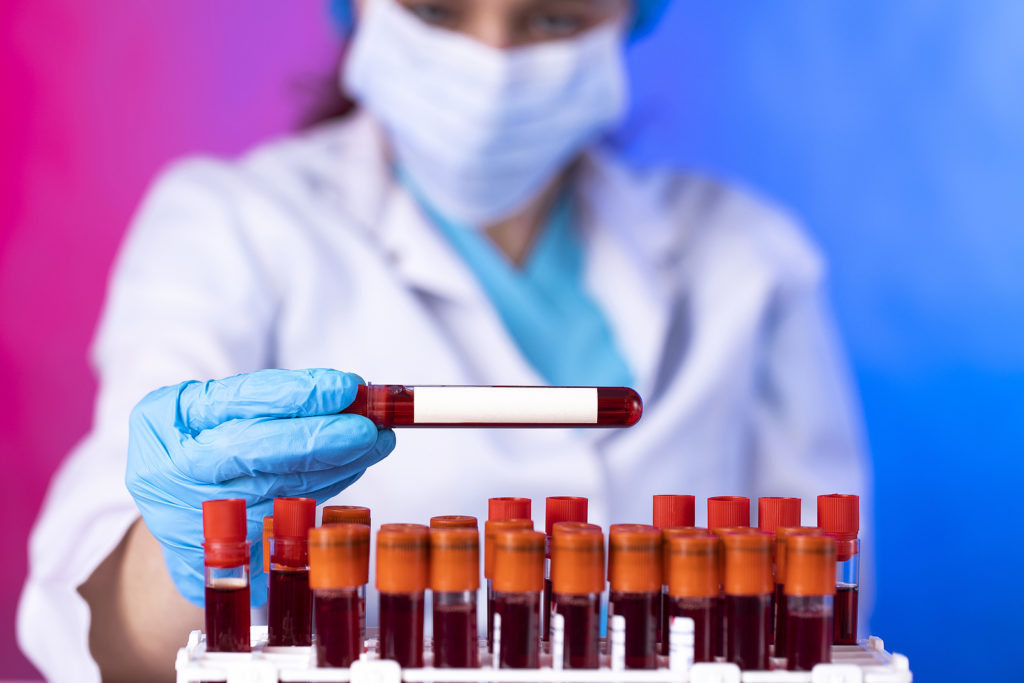Core Competencies You’ll Learn in a Phlebotomy school
Core Competencies You’ll Learn in a Phlebotomy school
Blog Article
The Course to Qualification: Recognizing the Phlebotomy Educating Training Course Journey and Its Value
As you consider the course to qualification in phlebotomy, it's crucial to comprehend the function you'll play in healthcare. Your training will cover vital skills, from blood collection techniques to patient communication.

The Role of Phlebotomists in Health Care
Phlebotomists play a vital role in the medical care system, functioning as the important web link between people and vital diagnostic screening. You'll do blood draws, ensuring samples are accumulated precisely and securely. Your know-how helps in detecting medical problems, keeping track of wellness, and directing therapy decisions.
In your everyday communications, you'll need to develop trust with patients, making them really feel comfy throughout what could be a stressful experience. You're accountable for classifying and dealing with examples meticulously to avoid contamination or errors, which can affect examination outcomes.
Yet, you'll usually work together with physicians and nurses, connecting crucial info concerning people' conditions. Your role is fundamental in maintaining the workflow in health care setups, making certain prompt and exact outcomes. By mastering your skills, you contribute meaningfully to client care, making you a crucial part of the medical group. Welcoming this duty is key to your success as a phlebotomist.
Review of Phlebotomy Training Programs
When checking out phlebotomy training programs, you'll discover various types designed to fit different timetables and finding out styles. Each program helps you develop important skills like blood collection and patient communication. Recognizing these choices is essential to choosing the best path for your career.
Kinds Of Educating Programs
A number of kinds of training programs are available for those looking to come to be proficient in phlebotomy. You can choose from certification programs, which commonly last a couple of months and concentrate on essential abilities. There are likewise diploma programs that provide an even more complete education, typically lasting as much as a year. If you're looking for a much deeper understanding, an associate degree in a relevant area could be the appropriate fit. On the internet courses supply versatility for those balancing job or family dedications, enabling you to research at your own rate. Furthermore, some hospitals and facilities provide on-the-job training programs, providing sensible experience while you discover. Whatever course you select, each program intends to furnish you with the essential skills for an effective phlebotomy profession.

Trick Abilities Developed
Grasping phlebotomy needs a collection of vital abilities that are created via detailed training programs. You'll discover technological abilities like correct blood vessel option, needle insertion, and blood collection techniques. These hands-on methods guarantee you can perform treatments safely and effectively. Furthermore, interaction abilities are essential; you'll need to engage with people, discuss procedures, and put them comfortable. Comprehending anatomy and physiology is vital, as well, as it assists you find veins and understand the body's action to blood attracts. Lastly, you'll get understanding of security protocols and infection control, assuring you keep a clean and sterile atmosphere. Each of these skills is essential for your success as a qualified phlebotomist, making you a useful possession in any type of healthcare setup.
Key Elements of a Phlebotomy Course
In a phlebotomy training course, you'll focus on crucial topics that lay the groundwork for your future job. You'll take part in hands-on training that allows you to apply what you've learned in real-world setups. Both the curriculum and functional experience are important for your success as a phlebotomist.
Curriculum Summary
While going after a phlebotomy training course, you'll encounter a core educational program designed to furnish you with basic skills and expertise. Phlebotomy Training Course. This educational program typically includes composition and physiology, concentrating on the circulatory system and comprehending blood parts. You'll additionally learn around various types of blood collection techniques, consisting of venipuncture and capillary slit strategies
In addition, infection important site control and safety protocols are important components, ensuring you recognize just how to preserve a sterilized atmosphere. You'll study patient communication, highlighting communication and compassion, which are essential for easing patient anxiety.
Hands-On Training Experience
Getting hands-on experience is a crucial component of your phlebotomy training course. This useful training enables you to use what you have actually discovered in a real-world setup, enhancing your abilities and confidence. Phlebotomy Training Course.
Additionally, you'll obtain the opportunity to engage with people, which is vital for establishing your communication skills. This combination of technical efficiency and social abilities is critical for your success as a licensed phlebotomist. Ultimately, hands-on training is where concept satisfies practice, strengthening your understanding and readiness for qualification.
Certification and Licensing Needs
Prior to you can start your career in phlebotomy, it is vital to recognize the qualification and licensing needs that differ by state. Most states call for phlebotomists to hold an accreditation from a recognized company, such as the National Phlebotomy Association or the American Culture for Clinical Pathology. These qualifications normally include passing an examination that examines your knowledge and skills in the area.
Along with certification, some states have particular licensing demands. You might need to complete a specific variety of hours in professional technique, send evidence of training, or undergo a history check. It is essential to investigate your state's policies to ensure you fulfill all needed requirements.
Remaining notified concerning these needs not just helps you secure a placement yet also improves your reliability as a specialist. By satisfying these needs, you'll be well on your way to a successful profession in phlebotomy.
Hands-On Training and Practical Experience
Hands-on training and practical experience are crucial parts of your phlebotomy education and learning, as they allow you to use theoretical knowledge in real-world situations. During your training, you'll participate in supervised venipuncture, discover proper techniques, and become acquainted with various blood collection equipment. This straight involvement is essential for building your self-confidence and developing your skills.
You'll function very closely with knowledgeable specialists that can lead you via the nuances of individual communication and example handling. Each practice session not just enhances your understanding yet also prepares you for the hectic environment of healthcare setups.
In addition, numerous programs integrate scientific turnings, enabling you to experience diverse settings, from healthcare facilities to outpatient centers. This exposure helps you adjust to various difficulties and person requirements, ensuring you're well-prepared for your future role. Accept these opportunities, as they're essential to ending up being a proficient and caring phlebotomist.
Challenges Dealt With During Training
While gaining hands-on experience is essential, it is very important to identify the obstacles that can arise during your phlebotomy training. You might come across anxiety when carrying out treatments on genuine patients, especially if you're brand-new to the atmosphere. The pressure to obtain every little thing right can be overwhelming. Furthermore, understanding the abilities needed for blood draws takes practice; you may fight with strategy initially.
Time management can likewise be an obstacle, as harmonizing concept, practical sessions, and personal dedications can really feel challenging. You may encounter varying learning speeds among your peers, leading to sensations of self-doubt if you think you're dropping behind. Lastly, adjusting to the different individualities of teachers can be challenging, as each might have a distinct teaching style.
Recognizing these barriers early can prepare you for success and aid you create strength throughout your training trip.
Career Opportunities After Certification

As you get experience, you might also think about specializing in locations like pediatric or senior citizen phlebotomy, dealing with specific patient requirements. Some phlebotomists choose to progress their careers by ending up being laboratory professionals or going after further education in health care fields.
In addition, your qualification can lead i thought about this to roles in training or managing new phlebotomists, enabling you to share your understanding. With the healthcare market consistently expanding, your abilities will certainly always be in need, leading the way for a secure and fulfilling job. Welcome the opportunities awaiting you!
Often Asked Inquiries
What Is the Normal Duration of a Phlebotomy Training Training Course?
Phlebotomy training programs usually last around four to eight weeks. You'll participate in hands-on practice, class direction, and on-line discovering. Finishing this training prepares you for qualification and a rewarding career in healthcare.
Are Online Phlebotomy Courses Available?
Yes, online phlebotomy courses are offered. They provide flexibility and convenience, permitting you to study at your very own pace. Simply verify the program is accredited to meet accreditation needs and acquire valuable skills for your occupation.
Exactly How Much Does Phlebotomy Training Commonly Price?
Phlebotomy training typically costs between $700 and $2,500, depending on the program and place. You ought to think about variables like program size, included products, and hands-on experience when picking the best training for you.
What Are Typical Requirements for Phlebotomy Training?
Typical requirements for phlebotomy training usually include a high institution diploma or GED, immunizations, and a history check. Some programs might additionally need basic health care understanding or qualifications, guaranteeing you're prepared for hands-on training.
Can I Work While Finishing My Phlebotomy Training?
Yes, you can work while finishing your phlebotomy training. Lots of students balance tasks with their research studies, however make certain to handle your time properly to assure you meet both job and training commitments effectively.
Report this page